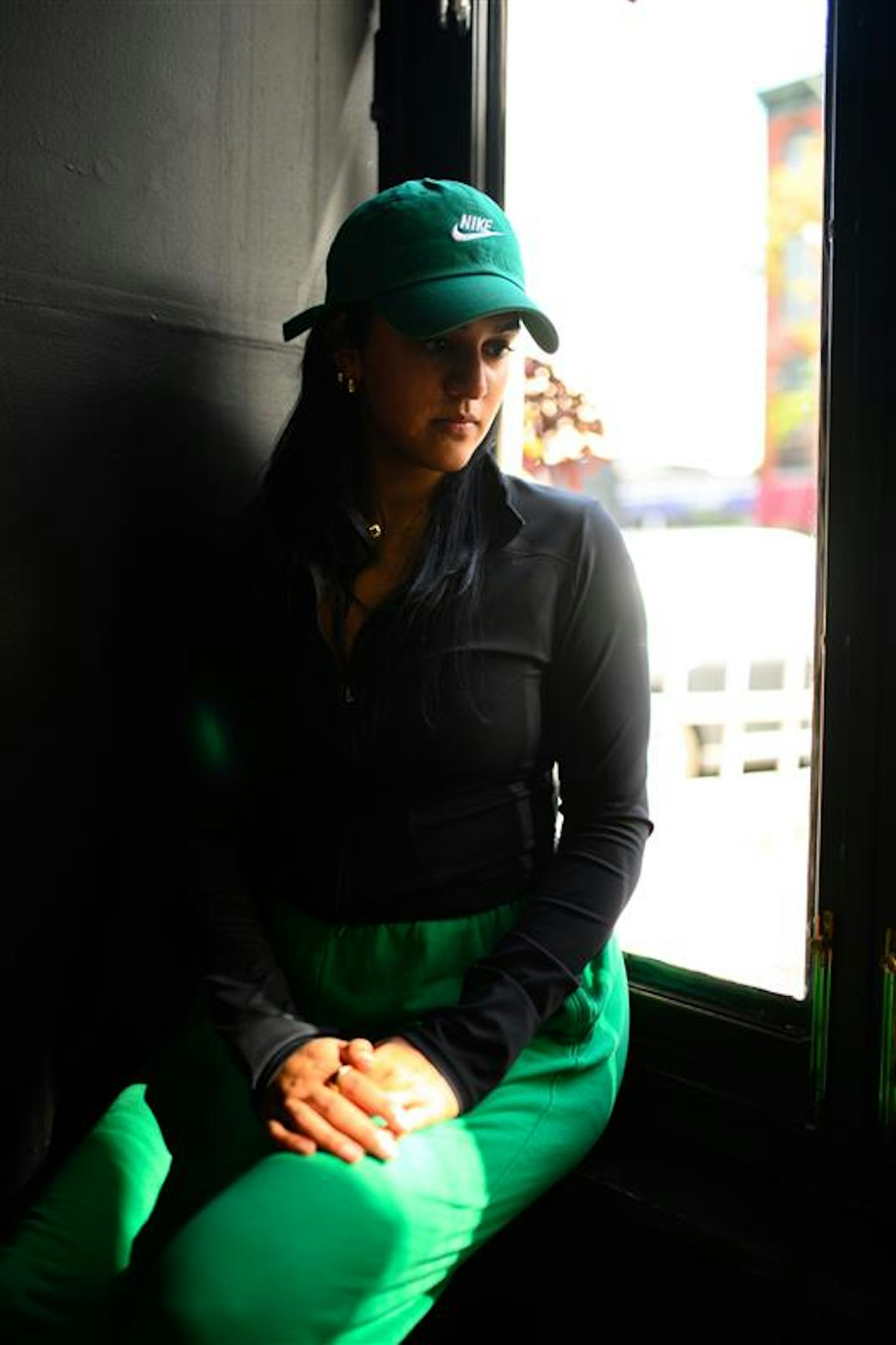The US election is days away and polls suggest the gender divide is bigger than ever, as women reject Trump and men run to him.
It’s a sunny October Sunday, three weeks before the US election, and Corinne, Josh and their two young daughters are on their way to a family event outside Philadelphia, Pennsylvania. As they drive past a row of pro- Donald Trump signs, Corinne starts to read them aloud sarcastically. ‘Look Josh, they say you don’t have to like Trump to vote for him,’ the 35-year-old teacher mocks. ‘I get it,’ Josh responds. ‘I’m on your side now.’ Josh, 39, a contractor, hadn’t always planned to vote Democrat. He’s a registered Republican. But as this election nears, he’s found Corinne’s case against the former President compelling and has changed sides. She despises Trump’s ‘hate-first approach’ but, ultimately, it’s the overturning of Roe v Wade, which protected abortion rights, that means she could never vote for him.

©Grazia
In 2022, Supreme Court justices appointed by Trump voted to end the right to abortion, meaning states can now ban or restrict access to them. Trump takes credit for this, and it has turned into one of the hottest election issues. It’s what many think is contributing to a bigger than ever gender divide. Every poll tells the same story: with her pro-choice message, Kamala Harris is winning among women, while Trump is winning with men. Polls suggest the gender divide is even bigger than when Trump ran against Hillary Clinton in 2016. ‘The gender gap looks like it could be on steroids,’ says independent Democratic pollster Celinda Lake on The New Yorker’s Political Scene podcast, explaining that the abortion issue has ‘really fired up women’. This is certainly the case in Pennsylvania, the swing state experts say is likely to decide the election. I’ve come to see how the gender divide is affecting relationships and playing out in people’s homes. ‘Our political conversations are probably one-sided when I get amped up,’ says Corinne. She made Josh watch the September debate between Harris and Trump, which helped convince him. Josh says Trump doesn’t align with his values. They were in Ireland when Roe v Wade was overturned. ‘I was flipping out. I was ranting, texting friends, posting on social media. At that point Josh was like, “I don’t really agree with abortion. Can we just enjoy our trip?” Since then, I’ve spent two years hammering home [to him] how important that single issue is. You see other parts of the world and never want it to be like that here, with the Taliban taking women’s rights away. It starts with one. I tell Josh, even if it doesn’t affect you personally, you should try and think about how it affects someone else.’ This election hasn’t just turned into the battle of the sexes, it’s divided husbands and wives. For every ‘persuadable’ husband, like Josh, there are women who will be voting differently to their husbands for the first time, who are delicately navigating political conversations because there’s no civil way to discuss them. Historically, married white women have voted in line with their spouse. But as each generation of women grows more economically independent and educated, it seems they’re making their own political decisions – meaning fewer wives toeing their husband’s party line. This will be the first election where Onita Maison-Luisi, 62, a stylist, hasn’t voted the same as her Republican husband, James Luisi, 68. They have heated discussions about everything from buying a car to how to raise their daughter [now 34], but politics has become a red line they don’t cross. Onita has already lost a good friend because their husbands fell out over politics – she’s seen what can happen so doesn’t attempt to change James’s mind.

©Grazia
‘Before Trump, I pretty much went for who my husband was voting for,’ says Onita, who’s visiting Pennsylvania from neighbouring New Jersey, where they live. ‘In 2016, I voted for Trump because James put a good case forward. But I can’t back someone who wants to take women’s rights back a step,’ she says. ‘My daughter’s of child-bearing age and she’s adamant she wouldn’t go to a state where abortion services aren’t available for her. A lot of women probably feel that way.’ For this reason, Onita thinks this election will see more women voting and a Harris landslide. (Currently, polls indicate Harris has a marginal lead, but many fear polls can’t be trusted.) ‘Women are so much more outspoken now. We didn’t do that in my day but they won’t stand for it any more,’ she says. James says he’s voting for Trump because he’s not happy with the Democrats’ stance on spending and immigration. What does he think of his wife’s despair at Trump’s views on women? ‘The US will not be strong economically or militarily because of abortion. It is immaterial and has nothing to do with anything that’s really important,’ he says. And if his daughter’s health was in danger unless she could access an abortion? ‘You go to the state where you can get an abortion,’ he says. In several states, pregnant women have to travel long distances in emergency conditions, and in some states abortion travel bans have even been proposed. Onita and James have agreed to disagree, but in some relationships the gender divide is driving couples apart as women choose politics over partners... Three months ago, Maisha Moosa, 21, a beauty influencer who works in marketing in Philadelphia, split up with her boyfriend of six years after learning he’s planning to vote for Trump. For Maisha, politics hadn’t cropped up much with her ex until political posts started flooding their social media feeds as the election approached. ‘First, I noticed he wasn’t challenging his friends when they spouted anti-abortion views. When I asked him not to talk about a sensitive topic that involves a woman’s body in that way he’d make excuses and say his friends “aren’t wrong”,’ she says. ‘I tried to explain why it was important but he’d laugh or go to sleep on the couch. There’d be nights where I’d go to bed crying. There was so much anger inside of me that my own boyfriend is like this and I can’t do anything about it.’

©Grazia
Maisha didn’t dare admit to him that she’s voting for Harris. ‘There would have been an argument and he’d have tried to convince me I’m crazy,’ she says. Her ex is 23. The gender gap is particularly pronounced for Gen Z, with men under 30 much more likely to vote for Trump than women under 30. Some young men feel left behind by changing gender roles, which has seen them gravitate towards the ‘macho’ character Trump likes to play. Where does Maisha think this side of her ex emerged from? ‘I think he was absolutely influenced by the way Trump and others [on social media] belittle or speak about women in a derogatory way,’ she says. A distance grew between Maisha and her ex and the relationship broke down – his decision to vote for Trump being one of the issues that tore them apart. ‘I feel relief that he’s out of my life now.’ Looking for a new partner she ‘would want to know where they stand on this stuff much earlier in the relationship’, she says. Both presidential campaigns have been playing to the groups backing them: Harris embraced Brat summer, went on Alex Cooper’s Call Her Daddy podcast and did a US Vogue cover. (Her Taylor Swift endorse- ment is a nice-to-have, too.) Meanwhile, Trump has embraced the manosphere, where misogyny is rife. In mid-October, his campaign tried to address its woman problem and Trump did a Town Hall with an all- female audience, where he hinted abortion bans could be reversed. Sofia Abbruzzesi, 22, a student, and her boyfriend Stuart Gruters, 24, who works in sales, have found they’re locked in a recurring argument where she is trying to convince him to vote for Harris. They agree on reproductive rights and the danger another Trump presidency would bring, but Stuart feels disillusioned by both main parties and wants to find an alternative or abstain. Sofia is des- perately trying to persuade him not to throw away a vote. ‘You’re taking a vote away from someone who could actually make a change in the country,’ she says.

©Grazia
As the gender divide has deepened, organisations have popped up to try to de-polarise the US. Braver Angels runs workshops to help those who disagree politically to engage with each other. Its Pennsylvania state coordinator, Bill Madway, tells me that at one recent workshop he asked a man why he was there. ‘He said he was trying to save his marriage; he and his wife were so divided by their clashing political views,’ Madway says. ‘We tend to think of the harm polarisation causes in the context of politics and Government,’ he adds. ‘The truth is, it often hits closer to home.’ Among women in Pennsylvania, anger over the abortion ruling feels palpable and support for Harris urgent. A fire has been lit and women are mobilised. Now, it’s down to men to decide if they are ready for their first female President. Can the Kamala wives persuade them? Will Harris reach men before more of them turn to Trump? On 5 November we’ll find out – and it will affect us all.
Just so you know, we may receive a commission or other compensation from the links on this website - read why you should trust us




















 English (US) ·
English (US) ·